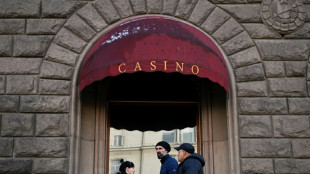
-
 EU's top diplomat backs Trump call to boost defence spending
EU's top diplomat backs Trump call to boost defence spending
-
Simmering anger as Turkey begins burying 76 fire victims

-
 Masa Son, Trump's Japanese buddy with the Midas Touch
Masa Son, Trump's Japanese buddy with the Midas Touch
-
Borussia Dortmund sack Sahin after Champions League setback

-
 US govt workers in diversity jobs to be put on leave as programs ordered shut
US govt workers in diversity jobs to be put on leave as programs ordered shut
-
Shelton grinds past Sonego into Australian Open semi-final

-
 Borussia Dortmund sack coach Nuri Sahin after Champions League setback
Borussia Dortmund sack coach Nuri Sahin after Champions League setback
-
Markets rise after Trump AI pledge but China tariff fears return

-
 'Did not push hard enough': Navalny lawyer speaks of regrets
'Did not push hard enough': Navalny lawyer speaks of regrets
-
Bulgaria court ruling turns spotlight on gambling addiction

-
 Inoue focused on Korean with bright lights of Vegas on horizon
Inoue focused on Korean with bright lights of Vegas on horizon
-
Mauricio Funes: journalist turned El Salvador president

-
 Navarro urges rule change after double-bounce furore in Melbourne
Navarro urges rule change after double-bounce furore in Melbourne
-
Asian traders cheer Trump AI pledge but China tariff woes return

-
 Lesotho's king pitches green energy to Davos elites
Lesotho's king pitches green energy to Davos elites
-
Buttler rejects calls for England to boycott Afghanistan match

-
 'I believe': Swiatek surges into Australian Open semi with Keys
'I believe': Swiatek surges into Australian Open semi with Keys
-
Indonesia rescuers search for survivors as landslide kills 19

-
 Triple-doubles for Jokic and James fuel lopsided NBA wins
Triple-doubles for Jokic and James fuel lopsided NBA wins
-
Five things about the 2025 World Rally Championship

-
 'Love for humanity': Low-crime Japan's unpaid parole officers
'Love for humanity': Low-crime Japan's unpaid parole officers
-
Indonesia rescuers search for survivors as landslide kills at least 17

-
 Trump targets opponents, faces criticism from cathedral pulpit
Trump targets opponents, faces criticism from cathedral pulpit
-
S. Korea to overhaul some airports after Jeju Air crash

-
 Resilient Keys 'really proud' to be back in Melbourne semis
Resilient Keys 'really proud' to be back in Melbourne semis
-
Bloodied Welsford fights back from crash to win another Tour stage

-
 Swiatek sweeps into Melbourne semis, Sinner faces home test
Swiatek sweeps into Melbourne semis, Sinner faces home test
-
Rampant Swiatek sweeps into Australian Open semi-final with Keys

-
 Lanterns light up southern Chinese city ahead of Lunar New Year
Lanterns light up southern Chinese city ahead of Lunar New Year
-
'Worst ever' Man Utd turn to Europa League as saving grace

-
 Brazil saw 79% jump in area burned by fires in 2024: monitor
Brazil saw 79% jump in area burned by fires in 2024: monitor
-
Resilient Keys beats Svitolina to reach Australian Open semi-finals

-
 Most Asian markets rise after Trump AI pledge but China tariff woes return
Most Asian markets rise after Trump AI pledge but China tariff woes return
-
Djokovic mentally ready for Zverev but worried about creaking body

-
 As Trump takes aim at EVs, how far will rollback go?
As Trump takes aim at EVs, how far will rollback go?
-
No home, no insurance: The double hit from Los Angeles fires

-
 Trump targets opponents, faces criticism from catherdral pulpit
Trump targets opponents, faces criticism from catherdral pulpit
-
Ichiro becomes first Japanese player elected to MLB Hall of Fame

-
 Relentless Swiatek, dizzy Sinner eye Australian Open semi-finals
Relentless Swiatek, dizzy Sinner eye Australian Open semi-finals
-
Colombian forces edge into guerrilla strongholds

-
 Netflix reports surge in subscribers, new price hikes
Netflix reports surge in subscribers, new price hikes
-
Panama complains to UN over Trump canal threat, starts audit

-
 Rubio, on first day, warns China with Asian partners
Rubio, on first day, warns China with Asian partners
-
Ichiro, the Japanese Hall of Famer who helped redefine baseball

-
 Ichiro becomes first Japanese elected to MLB Hall of Fame
Ichiro becomes first Japanese elected to MLB Hall of Fame
-
CORRECTION - Pantheon Resources PLC Announces Preliminary Log, Core and Cuttings Analysis

-
 Borussia Dortmund and Nuri Sahin End Their Collaboration
Borussia Dortmund and Nuri Sahin End Their Collaboration
-
ZeroPath Corp. Launches Next-Generation Code Security Platform Powered by Artificial Intelligence

-
 Guardian Metal Resources PLC Announces Presidential Executive Order
Guardian Metal Resources PLC Announces Presidential Executive Order
-
Cashmere Valley Bank Reports Annual Earnings of $28.2 Million and Increases Semi-Annual Dividend


US experts: militarily, the Russian invasion is a disaster so far
The Russian military's initial invasion of Ukraine has been a surprising strategic and tactical blunder marked by food and fuel shortages, abandoned armored vehicles, aircraft losses and troop deaths, US experts say.
But the failures of the first days, including vastly underestimating the Ukrainians' willingness to fight back, could lead to a frustrated Moscow deciding to unleash all its power and indiscriminately destroying large swathes of Ukraine, they said.
US specialists who study the Russian military say they have been astonished by the mismanagement of the campaign, which has seen invading columns stalled, apparently hundreds of Russian armored vehicles lost, and the Ukrainians preventing the Kremlin's air force from controlling the skies.
"If you were going to screw it up two or three weeks in, I might understand it," said Scott Boston, a senior defense analyst at the Rand Corp. think tank.
"But if you, like, tripped over the doorframe on the way into the house, you have another issue," he said.
- 'Disaster, through and through' -
The Pentagon and private sector experts expected Russian President Vladimir Putin's army to quickly destroy Ukraine's ability to fight back, undermining its command and control of the 200,000-strong Ukraine military, wrecking its missile defenses and destroying Kyiv's air force.
None of that has happened in the first six days. And, although there are no reliable estimates of the dead, injured and captured Russian troops, the numbers appear to be much higher than what would have been expected in a well-managed invasion.
"This is a colossal intelligence failure that vastly underestimated Ukrainian resistance, and military execution has been terrible," Michael Vickers, former US Under Secretary of Defense for Intelligence, said this week at the Center for Strategic and International Studies.
"His main attack has been underweighted. It's been piecemeal. His reconnaissance elements have been captured, columns have been destroyed," he said.
"It's just a disaster, through and through."
- Aircraft losses -
An assessment by military experts of the Atlantic Council's Scowcroft Center pointed to the crucial failure of the Russians to quickly seize and hold an airport just outside Kyiv.
The fight over the airport left it likely too damaged to use as planned to invade Kyiv, they said.
Moreover, they said, "Russian aircraft and helicopter losses have been surprisingly high and unsustainable," because they did not destroy the Ukrainians' air defenses.
Also surprising was the limited or ineffective deployment of electronic warfare weapons, which most analysts expected would have a significant role in attacking the Ukrainians' ability to communicate.
"Were the Russians able to cut off Ukrainian military leaders from those they are commanding ... Ukrainian air and air-defense forces would have been forced to fight in an uncoordinated fashion, making them less lethal and more susceptible to attack," the Scowcroft Center report said.
Boston pointed out that the Ukrainians have continued to use their Turkish-made Bayraktar drones to destroy Russian armor.
"If they got hit with the Turkish drones once or twice, okay," he said.
"If they got hit more than once or twice, something's wrong on the Russian side."
- Food shortages -
Pentagon spokesman John Kirby said that the Russians appeared to not coordinate well their sizable and diverse capabilities, or manage the logistics for the invasion.
"We're seeing indications here early on that though they have sophisticated combined arms capabilities, that they're not being necessarily fully integrated," he said.
Equally surprising was their logistics shortcomings.
"We're seeing vehicles abandoned. We're seeing sustainment problems not just in fuel but in food," he said Wednesday.
Boston, who has taken part in high-level war games focused on the Russian force, said there are signs they much of the force is young, undertrained for this kind of conflict, and probably unaware they were even going to war.
He said it appeared, too, that the troops on the ground had no sense of what they were trying to do in invading Ukraine, with its longstanding ties to Russia.
"If you don't know what's going on ... you can't adapt," he said.
None of the experts count the Russians out. The Russian force's advance has stalled, but that could allow it to resolve its logistical problems, noted Kirby.
And to the contrary, they expect Putin's frustration over the first days could lead to his unleashing the full force of his artillery, missiles and air power on the Ukrainian population with devastating effect.
"Russia still holds the overwhelming combat power advantages that will eventually grind down Ukrainian forces as the war continues," said the Scowcroft Center analysis.
K.Hill--AT
